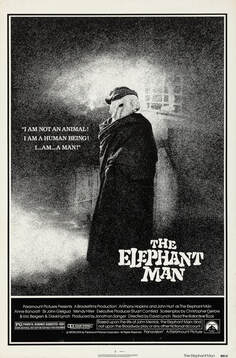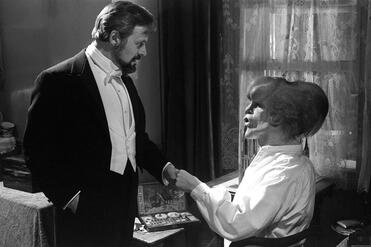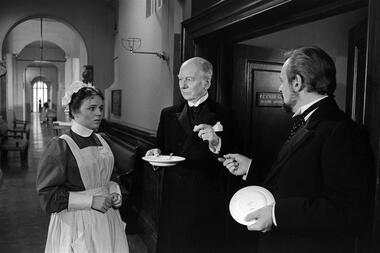
Who could imagine that one of the most poignant, warm, and virtuous films of the 1908s might have originated from the mind of director David Lynch – a truly idiosyncratic filmmaker, primarily known for creating nightmarish cinematic visions which bemuse and unsettle? On paper, this marriage of subject and director simply doesn’t add up. And yet, as we enter the real-world nightmare that - for some time - was sadly the life of John Merrick (John Hurt), we come to understand why Lynch was exactly the right director for the job…
Set in Victorian London, in the late 1800s, we follow the tragic, if fascinating true story of one John Merrick - an ill-treated freakshow performer who was afflicted by horrific, congenital deformities that affected both his skeleton and areas of soft tissue. One day, whilst being exploited for profit via public exhibition, Merrick is spotted and subsequently rescued by celebrated surgeon Dr. Frederick Treves (Anthony Hopkins). In taking pity upon Merrick, Treves sees beyond his shocking appearance to encounter a tender, capable, and intelligent man – one who might be able to teach even a knowledgeable person such as himself, what it means to be a human being who is loved.
Having spoken the Psalm aloud with fervour, Treves and Carr Gomm stand before Merrick awestruck, now realising his true capabilities. It’s as if the two men had witnessed something miraculous. “I don't understand”, says Carr Gomm in a state of shock. “Tell me, John, how did you know the rest of the 23rd Psalm?”, asks Treves (for he had taught but only a small portion to Merrick). Merrick, having regained his composure, responds with a rather unexpected answer: “I... I used to read the Bible every day. I know it very well. The Bible, and the Book of Common Prayer. The 23rd Psalm is beautiful, it’s my favourite.” Merrick’s gentle response, coupled with the knowledge that he kept a Bible at his bedside throughout his time at the London Hospital, speaks to how important his faith was to him. But the way in which he conducted his behaviour, also indicated to me that he found all that he needs in the Lord – not in materialism nor fame, or the seeking of medical treatment to somehow alter his appearance. No, Merrick reportedly lived a simple life within his small quarters in the hospital, and seemed to be genuinely content, even when faced with such tragic circumstances, the reality that he in fact owned very little and his low standing in society. Can we too find ever hope to find such contentment?
The Bible teaches that we too can trust God to take complete care of our lives and richly provide us with everything that we need, according to His divine will. How do we know this? Jesus himself informed His followers (and by extension, us) that those who love and know Him, simply don’t need to worry about accumulating possessions and wealth – for we need only trust that God will provide us with what we consider to be the ‘essentials’, in the everyday. We just need to ask Him to “Give us today our daily bread” (Matthew 6:11, NIV), trusting that because He is our heavenly Father who loves His children, He will not give “a stone” to those who “ask for a loaf of bread” (Matthew 7:9, NLT). Rather, He will “give good gifts to those who ask him” (Matthew 7:11, NLT), just as earthly fathers would seek to treat their children well. And this is something we don’t ever need to worry about or doubt. For Jesus noted that “the crows… don't plant seeds or gather a harvest; they don't have storage rooms or barns”, yet “God feeds them!” (Luke 12:24, GNT) And those who are His children, “are worth so much more than birds!” (Luke 12:24, GNT). All we must do then, Jesus says, is “seek the Kingdom of God above all else, and he will give you everything you need” (Luke 12:31, NLT).
Merrick is said to have lived his life as a devout Christian, firmly placing his hope and trust in Jesus Christ. And the film communicates well Merrick’s overall contentment and knowledge that even when he had nothing in the eyes of the world, he had everything in Christ – for He is Merrick’s shepherd who accepted him with open arms, despite what some would call imperfections or flaws. In one tender moment, Merrick – having been extended great kindness by Treves and other hospital staff – calmly explains to him that despite once being exploited for profit, he is “happy every hour of the day” and that “my life is full, because I know that I am loved”. He is referring to the love shown to him by Treves, yes, but also Christ. And we too can know our hearts to be made full by the generous love of Jesus, who “came to seek and save those who are lost” (Luke 19:10, NLT) through His atoning sacrifice on the Cross and subsequent resurrection, so that we might “have life, and have it abundantly” (John 10:10, NRSV). In Christ alone, we find our redemption, salvation, sanctification, worth and so much more. And this is all because of Jesus – only Jesus.
Why not prayerfully invite a friend or family member who doesn’t yet know Jesus, to watch The Elephant Man for themselves? Use the film’s themes to ask them what they thought of the film, if they spotted any links to Christianity and what they might think of the Gospel’s response to this subject.
If you feel able to, ask them how they would have felt if they were in Merrick’s position. Would they have hidden themselves away from society and given in to bitterness because of being born with such terrible afflictions? Or would they have responded like Merrick, with praise and thanks for his creator, God? Regardless of their answer, ask them why. Afterwards, prompt them to consider Merrick’s love for the shepherd (God), whom he trusts in completely, to provide all that he needs – are they able to put such great trust in those around them? Could they consider putting their trust in the Lord who is, to so many, their shepherd?
Take the opportunity to share the hope of the Gospel message with them, encouraging them in the knowledge that God loves His creation no matter what. His love for humanity isn’t dependent upon one’s looks, occupation, status, wealth, or anything else. He simply loves us and longs for us to come into life-saving relationship with Him. And we know this, because He sent His One and only Son Jesus Christ to pay the price for our sin, in dying on the cross – thereby making a way for us to be able to come before God and ask for His forgiveness. In doing so, we are redeemed, given the gift of friendship and eternal life in Heaven with Him (after we die), and accepted into His family. No matter where we’ve been, what we’ve done or what we look like, the Good News of Christianity is that we all may draw near to God, who gives us fulness of life. Ask them if they’ve ever considered what it might mean to live an abundant life, and if they’d like to explore for themselves.
Prior to watching the film for yourself, however, take a moment to pray that God would speak to you through the show. If you feel comfortable, pray this prayer over all your future, film-watching experiences:
Dear Lord, as I watch this film, I ask that you would be present here with me. Highlight to me anything within it that is honourable, anything that can be used in conversation for your Kingdom purposes. Amen.
The Elephant Man is currently available to rent on all good streaming services (U.K.).



 RSS Feed
RSS Feed